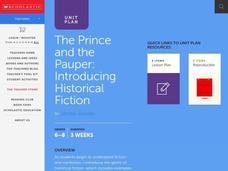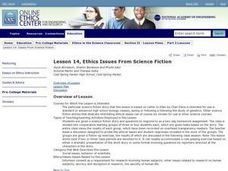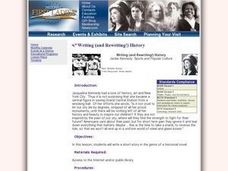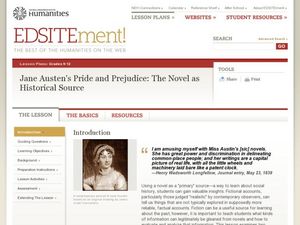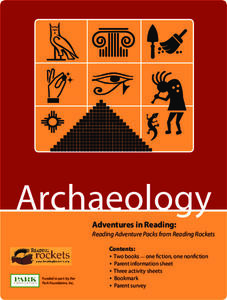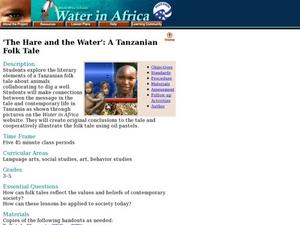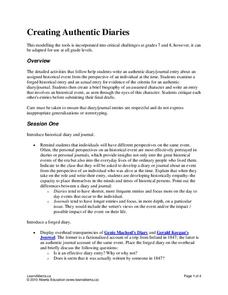Curated OER
The Prince and the Pauper
Mark Twain, the famous American author, is often studied in the school system. Use "The Prince and the Pauper" to analyze the differences between the text and its video version. This lesson includes several culminating project ideas for...
Curated OER
The Seeds We Need
Learners apply word analysis skills to recognize new words, identify genres of fiction and nonfiction, and identify important themes and topics. They explore differences in plants, flowers, and vegetables. A book bag full of activities...
EngageNY
Peer Critique: Historical Accuracy of Ideas and Vocabulary
Promote collaboration in the classroom with a historical fiction instructional activity. Fourth graders partner up and read the other's narrative to give feedback on vocabulary choice and the accuracy of historical information. After...
Curated OER
Ethics Issues From Science Fiction
Students analyze ethics issues as they read science fiction works. In this science and ethics lesson, students read science fiction short stories of their choosing, investigate the ethics issues raised in the stories, and present...
Curated OER
Telling Fact from Fiction
Students explore fact and fiction. In this reading skills lesson, students complete a jigsaw reading activity (the reading material is not included) about Robin Hood, Sherlock Holmes, and Florence Nightingale.
Pennsylvania Department of Education
Using Literary Elements to Compare Fiction Texts
Students explore language arts by reading and reflecting on literary examples. In this fiction writing lesson, students read several different cultural versions of the story "Cinderella" and discuss their interaction with the story and...
Curated OER
Is It Moose-Mooses or Moose-Meese?
Students play librarian and have to shelve books on moose after determining whether the books are fiction or non-fiction. They must study Alaska and follow a format of questions to determine where to shelve the books.
National First Ladies' Library
Writing (and Rewriting!) History
Middle schoolers differentiate between fiction and non-fiction, discuss historical fiction, which combines both genres, choose historical novel from list and read independently, and write original short stories that combine elements of...
Curated OER
Jane Austen's Pride and Prejudice: The Novel as Historical Source
Young scholars examine historical fiction as historical sources. In this historical fiction lesson plan, students analyze excerpts from Jane Austen's Pride and Prejudice as well as Mary Wollstonecraft's A Vindication of the Rights of...
Curated OER
Writing a Historical Fiction Story
Middle schoolers create a historical fiction story. In this historical fiction instructional activity, students choose a time period to use as their setting. They create a story with true elements but fictional characters and plot.
Penguin Books
An Educator’s Guide to Ruta Sepetys
Historical fiction novels give readers a chance to step into someone else's shoes. An educator's guide from Penguin Common Core Lesson Plans provides resources to accompany three historical fiction novels written by Ruta Sepetys: Between...
PBS
Reading Adventure Pack: Archaeology
Readings of fiction and nonfiction texts followed by a series of activities put scholars in an archaeologist's shoes. Learners read two texts, Archaeologists Dig for Clues by Kate Duke and The Shipwrecked Sailor: An Egyptian Tale with...
Santillana USA
Celebra Kwanzaa
¡Celebramos Kwanzaa! Celebrate Kwanzaa through the fictional story Celebra Kwanzaa con Botitas y sus gatitos to delightfully explain the seven principles of Kwanzaa. Dual language learners participate in reading and vocabulary activities...
Curated OER
Equal Protection of the Law: Fact or Fiction
High schoolers focus on the 14th Amendment of the Bill of Rights to decide whether or not racism denies citizens of their rights under the amendment. They watch a movie, Every Two Seconds and complete a worksheet (included in the plan)...
Curated OER
The Hare and the Water: A Tanzanian Folk Tale
"The Hare and the Water," a Tanzanian folk tale, lends a global perspective to literary analysis. Learners spend the first two days reading and storyboarding. On day three, they examine folk tale elements (worksheet included), and design...
Curated OER
History: Fact of Fiction?
Students find a historial novel online and distinguish between fiction and nonfiction books. They research three historical events related to their novel and write a letter to a figure from their novel's time period.
US Institute of Peace
Simulation on The Case of “Palmyra”
War-torn Palmyra needs your help! Young negotiators play the part of citizens of opposing countries through an eye-opening simulation. The fictional countries of Siwa and Nizwa stand at the brink of war, and your class' job is to create...
Weebly
Nationalism Project
Don't just ask your class to define nationalism, but invite them to experience it with an engaging project. Learners are divided into groups to design four items—a flag, slogan, national anthem, and historical tale—for a fictional...
EngageNY
Planning Ideas: Developing a Colonial Character Profile
The second lesson in a historical fiction series encourages pupils to develop a character profile of a colonial person using research acquired in the previous unit. Learners prepare their historical fiction narrative by responding to a...
EngageNY
Practice Planning a Historical Narrative: The Wheelwright
Fourth graders use a four-square graphic organizer to plan a paragraph writing about a wheelwright. Using gathered research from the previous unit, young writers discover how to organize a plot in preparation for writing a historical...
K20 LEARN
Voices from the Past: History and Literature
Art can enhance the understanding of history. That's the big idea in a lesson that has young scholars read Randall Jarrell's poem "The Death of the Ball Turret Gunner" and an excerpt from John Hersey's Hiroshima, which provide a...
EngageNY
Revising for Organization: Timely Transitions
During the eighth instructional activity in a historical fiction unit, pupils practice thoughtfully transitioning their ideas sequentially. After the teacher models how to add these transitions using the Wheelwright draft created in a...
Alberta Learning
Creating Authentic Diaries
Napoleon Bonaparte once said, "What is history but a fable agreed upon?" A series of lessons encourages learners to look beyond the basic fable agreed upon related to events in history and consider multiple accounts of the event. The...
Urbana School District
Knocking Down Fences
After reading The Other Side and guiding children through a picture walk, third graders investigate evidence of the civil rights movement. In the mini unit, 3rd graders analyze photographs of the past and make connections between...
Other popular searches
- Non Fiction
- Historical Fiction
- Science Fiction
- Non Fiction Text Features
- Realistic Fiction
- Fiction and Nonfiction
- Elements of Fiction
- Fiction or Nonfiction
- Non Fiction
- Fictional Narrative
- Non Fiction Writing
- Teaching Historical Fiction


